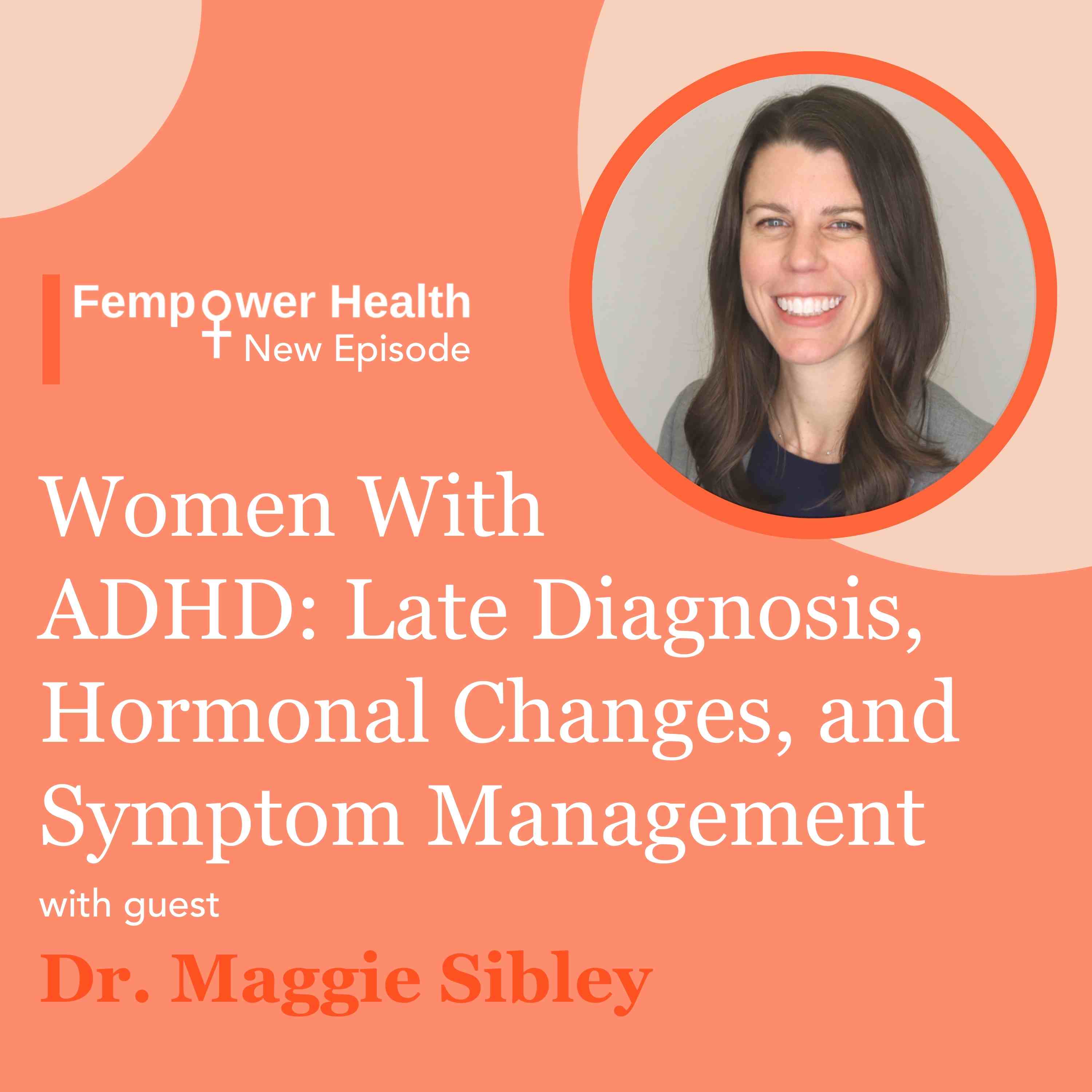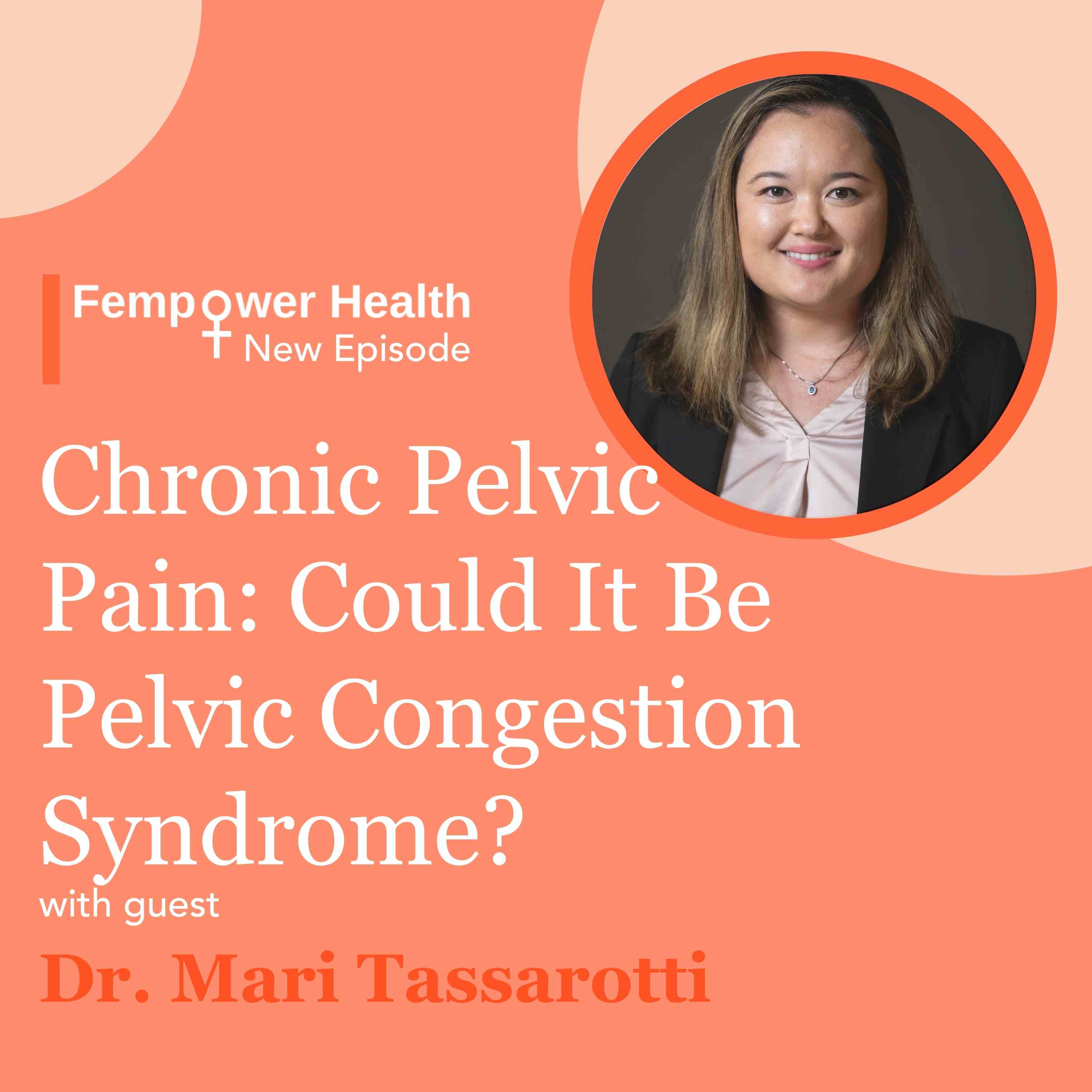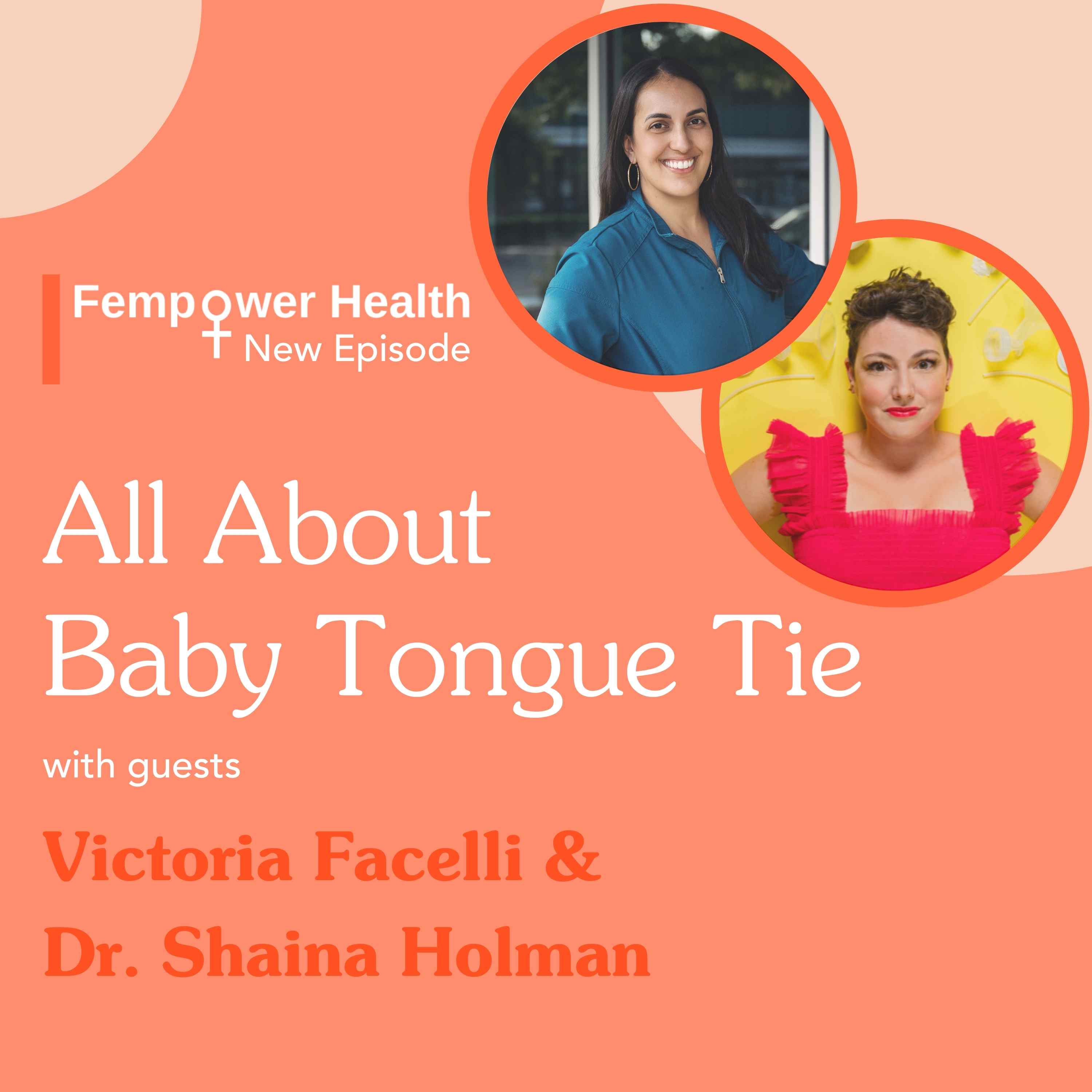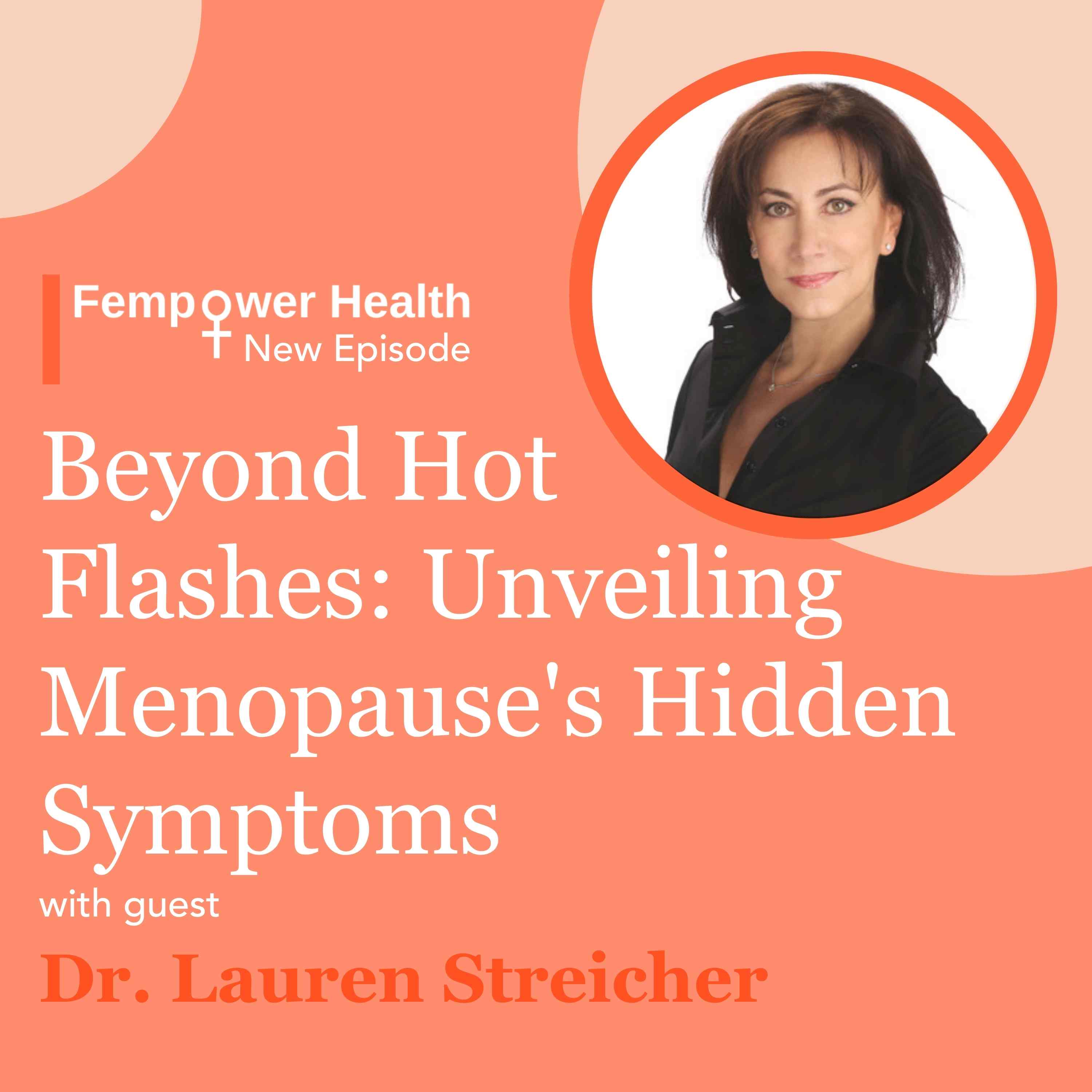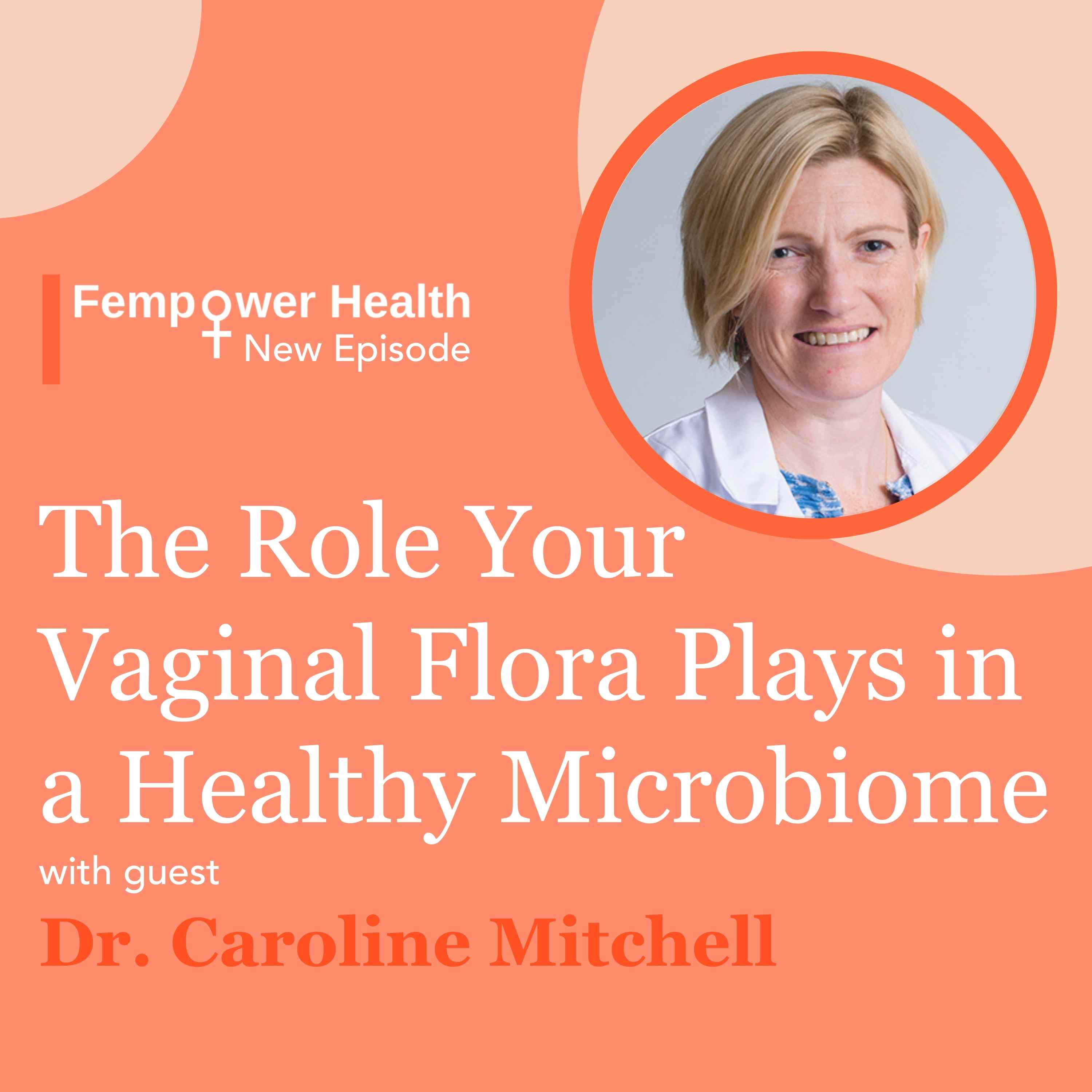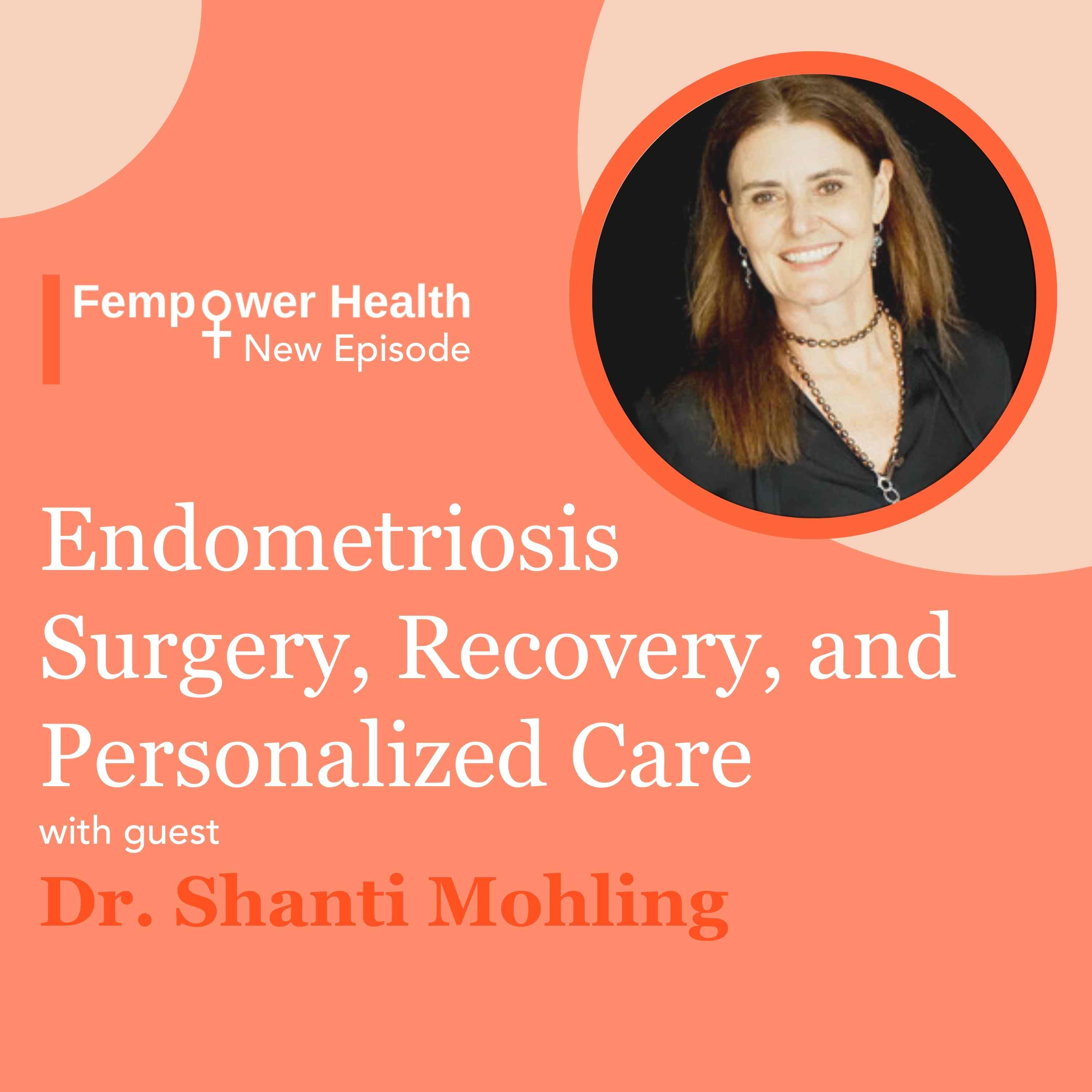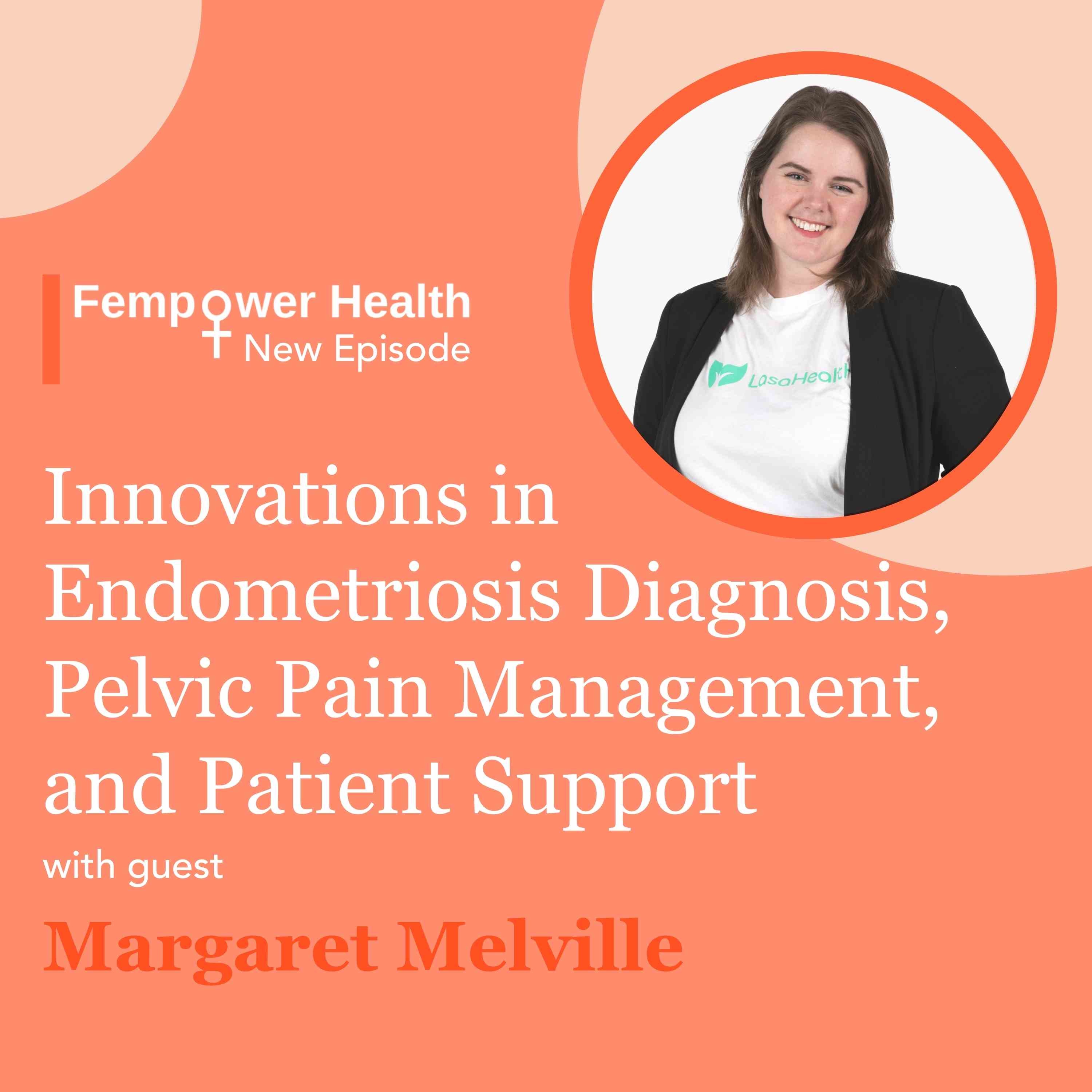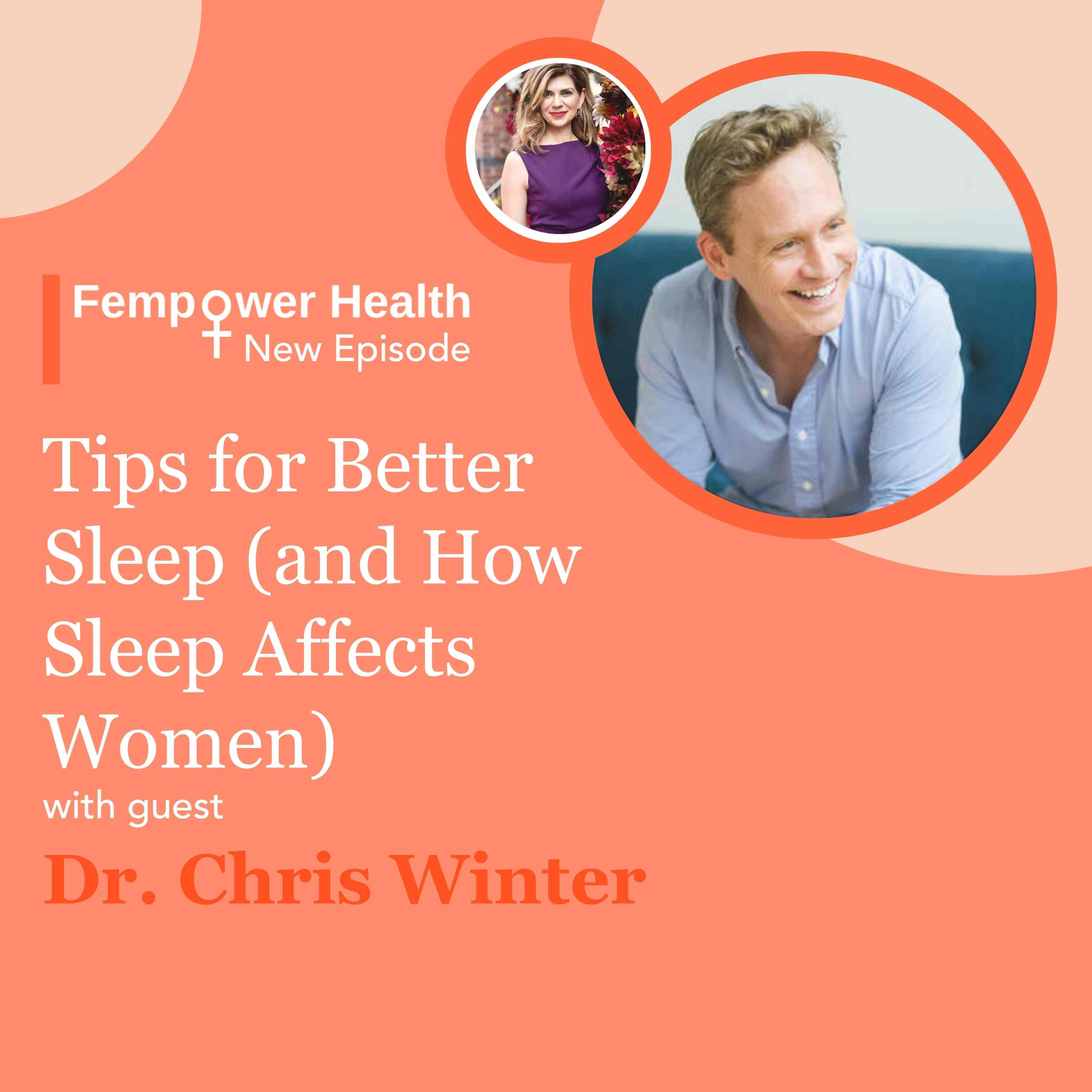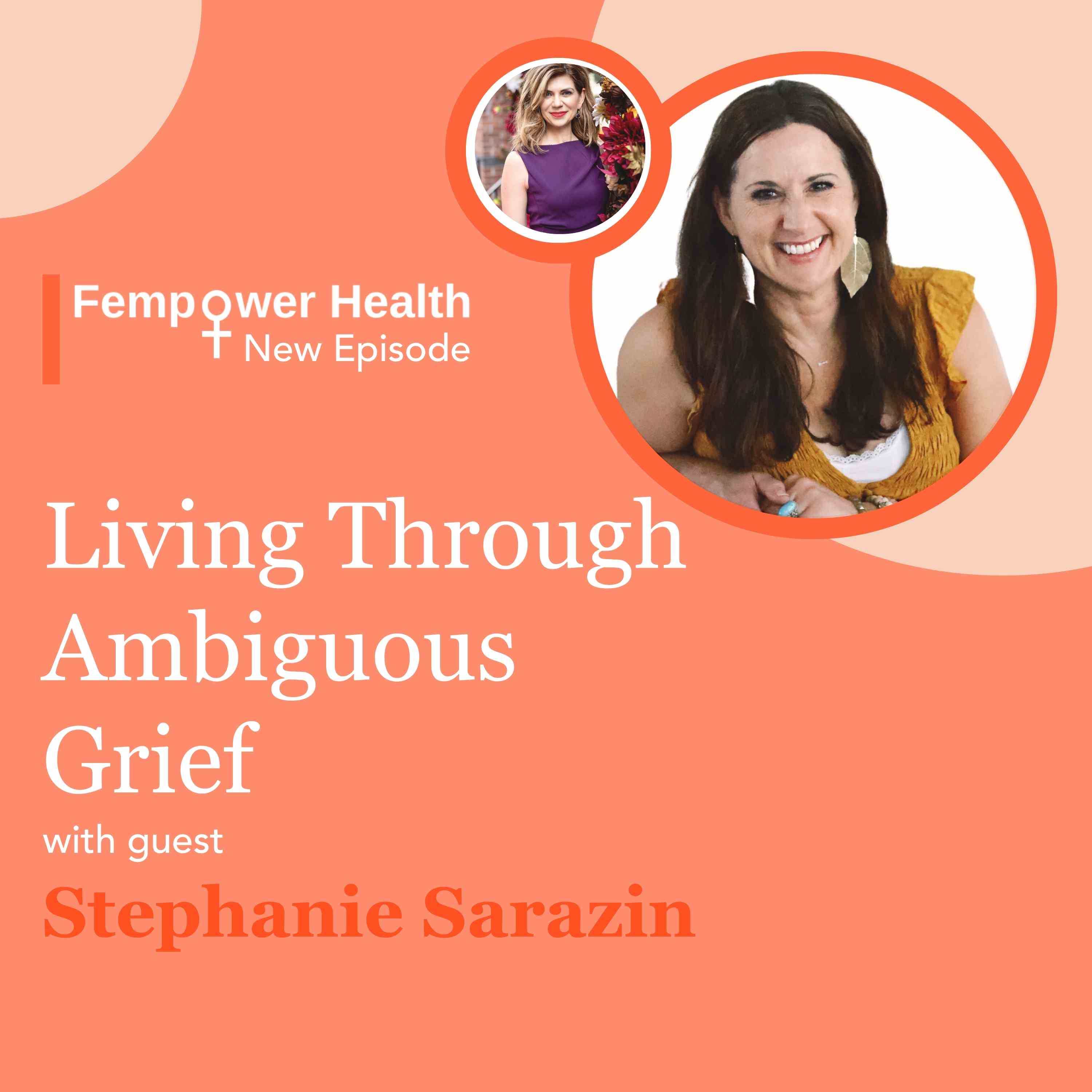Discover Fempower Health | A Women's Health Podcast
Fempower Health | A Women's Health Podcast

Fempower Health | A Women's Health Podcast
Author: Georgie Kovacs
Subscribed: 37Played: 1,893Subscribe
Share
© 2022-2023 Fempower Health
Description
Welcome to Fempower Health—where empowering women through every stage of life isn't just our mission; it's our passion.
Fempower Health is a beacon for women navigating the complex world of healthcare, providing a supportive platform where your voice is heard and your concerns are addressed with the compassion and understanding you deserve. Our podcast, a central hub for empowering information, is dedicated to women who find themselves on an exhausting quest for answers to their health questions and perhaps experience medical gaslighting. Whether you're in your reproductive years, facing the uncertainties of perimenopause, or navigating the challenges of post-menopause, Fempower Health is here to light the way forward.
Our content is meticulously designed with your needs in mind, focusing on essential women's health topics such as female reproductive health, managing menopause symptoms, autoimmune diseases, female cancers, endometriosis, and the journey of trying to conceive. We delve into often taboo topics like menstrual health, the complexities of perimenopause and menopause, and the critical balance of the gut and vaginal microbiome. Recognizing the holistic nature of health, we also cover women's mental health, pain management, pelvic health, Polycystic Ovarian Syndrome (PCOS), pregnancy and motherhood, thyroid disease, and female sexual health.
At Fempower Health, you'll gain access to world-renowned healthcare experts, including doctors, researchers, patient advocates, and women who share your struggles, providing a multifaceted perspective on health issues. We discuss not only the condition itself but also what is known versus unknown, empowering you with strategies to effectively communicate with your healthcare provider and guidance on finding the right specialists for your needs.
Beyond the podcast, Fempower Health extends its support through a rich array of women's health resources available on our website. Stay connected and informed through our social media channels and newsletter, where we continue to share health tips for women and the latest developments in women's healthcare.
Our founder, Georgie Kovacs, is a seasoned professional with over two decades of experience in the healthcare system, and brings a personal touch to Fempower Health. Having navigated her own health journey and advocated for her family through the intricacies of the healthcare system, she ensures that Fempower Health stands as a trustworthy and diligent advocate for women's health. This dedication is reflected in the rigorous vetting process for all guests, ensuring that you receive reliable, actionable information.
Join Fempower Health, the ultimate women's health podcast, as we explore, educate, and empower you to take control of your health journey. Here, we not only discuss what matters but also provide a path forward, breaking the silence on critical health issues and offering a community where you are seen, heard, and valued.
📣 Get the latest women's health news via the weekly newsletter: https://fempowerhealth.beehiiv.com/subscribe
📲 Stay Connected: Follow Fempower Health for more engaging content, expert interviews, and resources on women's health and wellness on
🌐 Website: https://www.fempower-health.com
🔅 Instagram: https://www.instagram.com/fempowerhealth
🔅 Facebook: https://www.facebook.com/fempowerhealth
🔅Twitter: https://www.twitter.com/fempower_health
🔅TikTok: https://www.tiktok.com/fempowerhealth
Fempower Health is a beacon for women navigating the complex world of healthcare, providing a supportive platform where your voice is heard and your concerns are addressed with the compassion and understanding you deserve. Our podcast, a central hub for empowering information, is dedicated to women who find themselves on an exhausting quest for answers to their health questions and perhaps experience medical gaslighting. Whether you're in your reproductive years, facing the uncertainties of perimenopause, or navigating the challenges of post-menopause, Fempower Health is here to light the way forward.
Our content is meticulously designed with your needs in mind, focusing on essential women's health topics such as female reproductive health, managing menopause symptoms, autoimmune diseases, female cancers, endometriosis, and the journey of trying to conceive. We delve into often taboo topics like menstrual health, the complexities of perimenopause and menopause, and the critical balance of the gut and vaginal microbiome. Recognizing the holistic nature of health, we also cover women's mental health, pain management, pelvic health, Polycystic Ovarian Syndrome (PCOS), pregnancy and motherhood, thyroid disease, and female sexual health.
At Fempower Health, you'll gain access to world-renowned healthcare experts, including doctors, researchers, patient advocates, and women who share your struggles, providing a multifaceted perspective on health issues. We discuss not only the condition itself but also what is known versus unknown, empowering you with strategies to effectively communicate with your healthcare provider and guidance on finding the right specialists for your needs.
Beyond the podcast, Fempower Health extends its support through a rich array of women's health resources available on our website. Stay connected and informed through our social media channels and newsletter, where we continue to share health tips for women and the latest developments in women's healthcare.
Our founder, Georgie Kovacs, is a seasoned professional with over two decades of experience in the healthcare system, and brings a personal touch to Fempower Health. Having navigated her own health journey and advocated for her family through the intricacies of the healthcare system, she ensures that Fempower Health stands as a trustworthy and diligent advocate for women's health. This dedication is reflected in the rigorous vetting process for all guests, ensuring that you receive reliable, actionable information.
Join Fempower Health, the ultimate women's health podcast, as we explore, educate, and empower you to take control of your health journey. Here, we not only discuss what matters but also provide a path forward, breaking the silence on critical health issues and offering a community where you are seen, heard, and valued.
📣 Get the latest women's health news via the weekly newsletter: https://fempowerhealth.beehiiv.com/subscribe
📲 Stay Connected: Follow Fempower Health for more engaging content, expert interviews, and resources on women's health and wellness on
🌐 Website: https://www.fempower-health.com
🔅 Instagram: https://www.instagram.com/fempowerhealth
🔅 Facebook: https://www.facebook.com/fempowerhealth
🔅Twitter: https://www.twitter.com/fempower_health
🔅TikTok: https://www.tiktok.com/fempowerhealth
194 Episodes
Reverse
Dr. Maggie Sibley explains the often-misunderstood reality of women with ADHD, from evaluation and treatment to symptom management and hormonal changes.Episode SummaryIn this fascinating episode of Fempower Health, Georgie Kovacs is joined by Dr. Maggie Sibley, a renowned women’s ADHD specialist and researcher. As a clinical psychologist and professor of psychiatry at the University of Washington School of Medicine, Dr. Sibley shares her research-based knowledge and unique perspective on the often overlooked and misunderstood topic of ADHD in adult women. Listen as we discuss the complexities of ADHD beyond childhood, the relationship between ADHD and hormones in women with attention disorders, and practical strategies for managing ADHD symptoms across different life stages.Key Discussion Points:Common misconceptions about ADHD being a children’s condition and the reality of how symptoms persist into adulthood.Research on the trajectory of ADHD from adolescence to adulthood and why it’s so important to recognize ADHD in adults.How ADHD symptoms in women manifest differently than men, including internalized symptoms like inattention and executive dysfunction. Connections between societal expectations of women and why ADHD often goes undiagnosed in women until later in life.How women’s hormonal changes impact regions in the brain that are associated with attention-deficit/hyperactivity disorder.Ways to treat and manage adult ADHD, including lifestyle modifications, medication, cognitive behavioral therapy, and personal coping strategies. The importance of structure, routine, exercise, and healthy diet for effective ADHD symptom management. Tips for navigating the healthcare system during the evaluation stage and treatment plans after diagnosis to ensure specialized care for women with ADHD.The importance of community support and further research for women with ADHD.“Estrogen interacts with dopamine in the brain, which can significantly impact ADHD symptoms, especially during hormonal transitions like perimenopause.” - Dr. Margaret SibleyRelated to this episode:Resources on Mental HealthRelated episode: Living With ADHD: Your Brain’s Not BrokenLearn more about Dr Margaret SibleyCHADD (Children and Adults with Attention-Deficit/Hyperactivity Disorder): This is the major advocacy organization for ADHD, providing support, resources, and community connections for both children and adults.ADDA (Attention Deficit Disorder Association): This organization focuses on the adult ADHD community, offering tools, resources, and networking opportunities for adults dealing with ADHD.Psychology Today: A resource for finding therapists who specialize in ADHD and other psychological conditions. Dr. Sibley recommends using their therapist finder tool to locate experts who specialize in cognitive behavioral approaches and other treatments for ADHD.If you're passionate about advancing women's health, there are many ways you can support the Fempower Health Podcast. Here's how:Subscribe and Listen: Tune in to new episodes every...
Women with pelvic congestion syndrome experience chronic pelvic pain pelvic varicose veins, and more. Learn about this underrecognized condition from Dr. Mari Tassarotti.Episode SummaryIn this episode of Fempower Health, we’re joined by Dr. Mari Tassarotti, an expert in interventional radiology from Columbia University. We discuss the complexities of Pelvic Congestion Syndrome (PCS), a condition characterized by chronic pelvic pain arising from varicose veins in the pelvis. We explore why Pelvic Congestion Syndrome remains underrecognized and often misdiagnosed. Dr. Tassarotti shares her insights on PCS diagnosis, innovative treatment options, and why seeking a second opinion can be crucial for patients navigating this condition.Key Discussion PointsWhat is Pelvic Congestion Syndrome (PCS) and why is it so hard to get the right diagnosis? Symptoms that distinguish PCS from other conditions and why it's a hidden cause of chronic pelvic pain.Questions women should be asking their healthcare providers if concerned about PCS or pelvic varicose veins.Pelvic congestion syndrome radiology and other Innovative, minimally invasive PCS treatments that are changing the game for PCS patients, and why these options might be preferable to traditional surgical methods.Challenges of getting PCS recognized by the medical community and insurance providers.Real-life stories shared by Georgie and Dr. Tassarotti that highlight the profound impact proper diagnosis and treatment can have on women's lives. “It's not just about recognizing the condition but understanding the woman's journey to get here. Many have been misdiagnosed or overlooked entirely.” - Dr. Mari TassarottiRelated to this episode:Resources on Pelvic HealthLearn more about Dr. Mari TassarottiFollow Dr. Tassarotti on LinkedIn and Twitter.Learn about Interventional Radiology and Pelvic Congestion EmbolizationLooking for an interventional radiologist? Check out this list from the Society of Interventional Radiology.If you're passionate about advancing women's health, there are many ways you can support the Fempower Health Podcast. Here's how:Subscribe and Listen: Tune in to new episodes every Tuesday by subscribing to the Fempower Health Podcast on iTunes or Spotify or your favorite podcast platform. Your regular listenership is invaluable!Leave a Review: Help us grow by leaving a review on iTunes or a...
What is a baby tongue tie and how is it treated properly? Learn as Dr. Shaina Holman & Victoria Facelli share their expertise.Episode SummaryIn this enlightening episode of the Fempower Health Podcast, host Georgie Kovacs sits down with Victoria Facelli, an internationally board-certified lactation consultant and author of "Feed the Baby," and Dr. Shaina Holman, a dentist with a PhD in infant psychophysiology. Together, we discuss the intricate topic of tongue ties in babies. This conversation comes in the wake of recent New York Times articles that have brought tongue ties and their treatment into the spotlight, raising concerns and debate among new parents and healthcare professionals alike. Our guests bring their extensive expertise and unique perspectives to offer a nuanced understanding of tongue ties, addressing common misconceptions, the importance of multidisciplinary care, and the ethical considerations in treatment. Whether you're struggling with breastfeeding, considering tongue tie release for your baby, or simply seeking reliable information, this episode is packed with valuable insights and advice. Key Discussion PointsWhat are tongue ties and how do they affect infant feeding (breastfeeding and bottle-feeding)?Are there long-term effects of tongue ties (speech, sleep apnea, dental health)?Symptoms of tongue ties in babies The surge in tongue tie diagnoses and treatments, including concerns about overdiagnosis and the role of healthcare professionals in promoting unnecessary procedures.Differences between scissors and laser tongue tie procedures, including benefits, risks, and factors influencing the choice of tongue tie treatment.The significance of a team approach involving lactation consultants, dentists, bodyworkers, and other specialists in achieving the best outcomes for babies with tongue ties.Navigating insurance coverage, Medicaid, and payment options for families seeking treatment for tongue tied babies.Information for parents on how to advocate for their babies, the importance of seeking knowledgeable and ethical providers, and resources for families with limited financial means."It's very common that when [babies] can't use their tongues very well, their upper lip muscles get really active... But that's not always because the structure itself is tight. It's often because the tongue is tight." — Dr. Shaina HolmanRelated to this episode:Resources Perimenopause and MenopauseRead Inside the Booming Business of Cutting Babies’ Tongues and What Parents Should Know About Tongue-Tie Releases by NYTimesRead reactions to the original NYTimes articles in Opinion | The Controversy Over Tongue Surgery for InfantsLearn more about Victoria Facelli, IBCL and follow her on Instagram and TikTokLearn more about
Fempower Health Digest Episode SummaryLearn what happened this month in the world of women’s health! New updates go live every fourth Tuesday of the month as Georgie Kovacs, founder of Fempower Health, shares a recap of the latest news and insights. For more deep dives into women’s health, sexuality, wellness, and life stages, enjoy interviews with experts and change-makers every Tuesday on the Fempower Health podcast. And if you have a suggestion for what you want Georgie to cover next, send an email: info@fempower-health.comWomen's Health Update Highlights:The Gold Rush in Women's Health: Exploring the New FrontierTime Crunch: The Race Against the Clock in Doctor's VisitsEmpowerment Through Advocacy: Unlocking the Power of ProactivityAI: The Next Revolution in Women's HealthNavigating the Maze: Systemic Challenges and Solutions in Women's Healthcare Resources:Recent podcast episodes: Listen hereBook recommendations: Browse the Book ShopSign up for the Fempower Health NewsletterIf you're passionate about advancing women's health, there are many ways you can support the Fempower Health Podcast. Here's how:Subscribe and Listen: Tune in to new episodes every Tuesday by subscribing to the Fempower Health Podcast on iTunes or Spotify or your favorite podcast platform. Your regular listenership is invaluable!Leave a Review: Help us grow by leaving a review on iTunes or Spotify. Your feedback not only supports us but also helps others discover our podcast.Share with Others: Spread the word by sharing episodes with friends, family, or anyone interested in women's health. Every share helps!Engage with Our Community: Follow us on Instagram, Facebook, and Twitter for the latest updates and engaging content.Stay Informed: Sign up for our weekly newsletter to receive the latest announcements, news, and research directly in your inbox.Reach Out: We love hearing from you! Reach out for inquiries, outreach, or even to share your questions and topics of interest.Together, let's build a stronger community dedicated to women's health. Your support is crucial in this journey!About GeorgieGeorgie Kovacs is a seasoned professional with over two decades of healthcare expertise, having made significant contributions at...
Learn the correlation between women’s health and menopause. Dr. Lauren Streicher shares the essentials of menopause management and tips for healthy aging.Episode SummaryIn this episode, Dr. Lauren Streicher, a distinguished expert in menopause management, joins to share her insights on this important life stage. Dr. Streicher discusses the complexities of menopause, offering facts and practical advice for women. With a career dedicated to enhancing women's health, she brings a wealth of knowledge from her clinical experience, research, and as the author of several pivotal books on menopause. This conversation explores the main aspects of menopause, from symptom management to the importance of open communication with healthcare providers, and how to embrace this transformative stage of life. Key Discussion PointsAn overview of women’s health and menopause, including high blood pressure, joint pain, insulin resistance, sleep disturbances, and hair loss.The complex relationship between menopause and painful intercourse, and the importance of accurate diagnosis beyond genitourinary syndrome of menopause (GSM).Strategies for finding access to a menopause specialist.The role of estrogen in the management of menopausal symptoms.Potential benefits and considerations for menopause hormone therapy.Efficacy, precautions, and recommendations regarding cannabis for menopause relief.The relationship between menopause and mental health, and how this can impact cognitive function.How to prepare for doctor's appointments when managing menopause and wanting to address your symptoms and concerns.Viewing menopause and aging as opportunities to focus on health, well-being, and embracing a new chapter in life."The power of education cannot be understated when it comes to menopause. Understanding the changes happening in your body is the first step towards managing symptoms effectively." - Dr. Lauren StreicherRelated to this episode:Resources and episodes on Perimenopause & Menopause Read Dr. Streicher’s story and follow her on LinkedInMidi Health: www.joinmidi.com Check out Dr Streicher’s Inside Information podcastIf you're passionate about advancing women's health, there are many ways you can support the Fempower Health Podcast. Here's how:Subscribe and Listen: Tune in to new episodes every Tuesday by subscribing to the Fempower Health Podcast on iTunes or Spotify or your favorite podcast platform. Your regular listenership is invaluable!Leave a Review: Help us grow by leaving a review on iTunes or Spotify. Your feedback not only supports us but also helps others discover our...
Learn how your vaginal flora and gut microbiome contribute to your reproductive health. Dr. Caroline Mitchell shares her expertise and research on this important but overlooked topic.Episode SummaryIn this episode, we take an in-depth look at the delicate balance of the vaginal microbiome. Dr. Caroline Mitchell, distinguished reproductive health researcher and faculty member at the Vincent Center for Reproductive Biology at Massachusetts General Hospital, shares her profound insight on why a healthy vaginal microbiome is crucial in women's health. With a background in Women’s Studies at Harvard College and groundbreaking research funded by prestigious organizations, Dr. Mitchell brings a wealth of knowledge and experience to the discussion. She explains the complexities of understanding vaginal flora, the challenges posed by bacterial vaginosis (BV), and the intriguing connections between gut health and vaginal health. Listen to learn about some of the most significant yet overlooked aspects of women's reproductive health. We discuss how to balance the vaginal microbiome, what to do about chronic bacterial vaginosis, use cases for a vaginal microbiome transplant, and what innovative treatments are emerging in women’s health. Key Discussion PointsWhy a healthy vaginal microbiome is crucial for women's overall health and how imbalances can lead to conditions such as bacterial vaginosis (BV).The difficulties of limited funding and the complexity of research regarding the vaginal microbiome.Symptoms of BV, its limited treatment options, and common misdiagnoses such as vulvodynia.Yeast infection vs. BV vs. UTI symptoms.The impact of antibiotic use on the vaginal and gut microbiomes, plus the need for caution and further research.Vaginal microbiome transplants and the potential of lactobacillus crispatus in treating BV, plus the future of an at-home vaginal microbiome test.What to consider when looking for the best women's probiotics for vaginal health, and how to avoid unnecessary products and irritants.The importance of accurate diagnosis, treatment, and management for vaginal health."When the good kind of lactobacillus are not dominating the vaginal microbial community, people are at higher risk for preterm birth, HIV acquisition, human papillomavirus—at risk for both acquisition and progression to cervical dysplasia and potentially cancer." - Dr. Caroline MitchellRelated to this episode:Resources and episodes on the Gut and Vaginal Microbiome Follow Dr. Caroline Mitchell on Instagram and LinkedIn. Follow her lab on Instagram.Learn more about Dr Mitchell’s research and consider enrolling in her clinical trials MOTIF (be a donor recipient)MOTIF (be a donor) VIBRANT study, looking at a live biotherapeuticLearn about thea...
Learn about endometriosis and pelvic health physical therapy to manage chronic pelvic pain. Dr. Caitlyn Tivy shares her experience and expertise to help women find relief.Episode SummaryIn this final episode of Fempower Health's four-part series on endometriosis, Dr. Caitlyn Tivy, a distinguished pelvic health physical therapist, shares the intricacies of managing endometriosis and pelvic pain. With a foundation in biomedical research and specialized training in pelvic floor physical therapy, Dr. Tivy emphasizes the importance of patient involvement, holistic treatment strategies, and the role of emotional health in physical well-being. She highlights innovative developments in telemedicine and the exploration of the vaginal microbiome as promising avenues for future advancements in pelvic health care. We discuss the intersection of physical health, PTSD, and trauma history in pelvic pain treatment. Key TakeawaysHow combining manual therapies, patient education, and at-home care can lead to significant improvements in managing endometriosis pelvic painWhy being an active participant in your endometriosis treatment plan can dramatically impact pain management How telehealth is breaking barriers to access pelvic pain treatment, offering new hope to those in remote or underserved areasThe latest research on how the vaginal microbiome impacts pelvic health and what it means for the future of pelvic pain treatmentHow the brain and nervous system contribute to your experience of endometriosis and pelvic painWhy consulting with a pelvic floor physical therapist post-surgery can improve your recovery processMyths around pelvic floor exercises like Kegels vs. their appropriate role and application in pelvic pain therapyA complex story about an endometriosis patient and the multifaceted approach to her recovery"How can we turn down that person's fire alarm so that the rest of their body isn't getting inundated by this irritating stimulus? Even if someone hasn't had surgery or doesn't intend on having surgery—or is not a candidate for some reason—there's still a lot that we can do to help people manage their ‘pain’ alarm system. We can create self-care strategies that keep their alarm quiet long-term." - Dr. Caitlyn TivyRelated to this episode:Resources for EndometriosisFollow Caitlyn Tivy on LinkedIn and her websitePart 1 of 4: Innovations in Endometriosis Diagnosis, Pelvic Pain Management, and Patient SupportPart 2 of 4: Endometriosis Care, Treatment Options, and Patient AdvocacyPart 3 of 4: Endometriosis Surgery, Recovery, and Personalized CareIf you're passionate about advancing women's health, there are many ways you can support the Fempower Health Podcast. Here's how:Subscribe and Listen: Tune in to new episodes every Tuesday by subscribing to the Fempower Health Podcast on a...
Dr. Shanti Mohling shares the details of endometriosis surgery, recovery, and pelvic floor therapy as important treatment options for patients with this condition.Episode SummaryIn this third episode of Fempower Health's series on endometriosis, Dr. Shanti Mohling, a minimally invasive surgeon, who devotes her clinical activity to patients with pelvic pain and endometriosis, explores the importance of excision surgery, the challenges of diagnosing and treating endometriosis, and strategies for managing its recurrence. She emphasizes the need for early detection, multidisciplinary approaches, and personalized care in improving outcomes for those affected by this complex condition.Key TakeawaysWhy surgery is the most effective treatment for endometriosis and how to find a doctor trained in endometriosis excision surgery. Screening and early detection of endometriosis, especially in adolescence, to prevent more invasive procedures later in life.Advantages of taking a multidisciplinary approach to endometriosis treatment and healthcare in general.Difficulties in diagnosing endometriosis, especially through imaging tests.Surgery's role in improving fertility, debunking myths such as pregnancy as a cure for endometriosis.Benefits of pelvic floor physical therapy to manage endometriosis and pelvic pain effectively.What the healing process of endometriosis surgery entails.The complexity of healthcare for endometriosis patients and the value of raising awareness and understanding of the condition."I think a lot of disease that recurs is inadequately treated, and yet we call it recurrent. It's really just persistent, not recurrent is my guess." - Dr. Shanti MohlingRelated to this episode:Resources for EndometriosisFollow Dr. Shanti Mohling on InstagramLearn more about Northwest Endometriosis and Pelvic Surgery in Portland, OregonPart 1 of 4: Innovations in Endometriosis Diagnosis, Pelvic Pain Management, and Patient SupportPart 2 of 4: Endometriosis Care, Treatment Options, and Patient AdvocacyIf you're passionate about advancing women's health, there are many ways you can support the Fempower Health Podcast. Here's how:Subscribe and Listen: Tune in to new episodes every Tuesday by subscribing to the Fempower Health Podcast on iTunes or Spotify or your favorite podcast platform. Your regular listenership is invaluable!Leave a Review: Help us grow by leaving a review on iTunes or Spotify. Your feedback not only supports us but also helps others discover our podcast.Share with Others:
Katie Boyce shares her expert insights on endometriosis care, treatment options, and the importance of patient advocacy for long-term management. DetailsEpisode SummaryIn this second episode of Fempower Health’s four-part series on endometriosis, we speak with guest Katie Boyce, a Board Certified Patient Advocate with a robust background in biochemistry and astrophysics. We discuss the complexities of endometriosis care from patient and specialist perspectives. We explore the treatment options for endometriosis as well as its causes and the critical importance of specialized care. Through Katie's personal journey with endometriosis and her experience working with endometriosis patients, she shares expert insights on the nuances of endometriosis diagnosis, the controversy surrounding various treatments, and the hopeful future of new medical advancements.Key TakeawaysWhat makes endometriosis a particularly challenging condition to understand, diagnose, and treatPros and cons of popular endometriosis treatments, including the debated use of drugs like Lupron and Orilissa, and what the latest research saysThe critical role of expert surgery for endometriosis and fertility concerns, and why choosing the right surgeon matters for long-term outcomesHow endometriosis patients can navigate the healthcare system to find the best care for endometriosis, including tips for vetting doctors and making informed treatment decisions.Promising new treatments for endometriosis and the future of research in the field, offering hope to those affected by the condition"The journey to managing endometriosis is as much about empowerment and informed choices as it is about medical treatment." - Katie BoyceRelated to this episode:Resources for EndometriosisConnect with Kate Boyce and follow her on InstagramPart 1 of 4: Innovations in Endometriosis Diagnosis, Pelvic Pain Management, and Patient SupportIf you're passionate about advancing women's health, there are many ways you can support the Fempower Health Podcast. Here's how:Subscribe and Listen: Tune in to new episodes every Tuesday by subscribing to the Fempower Health Podcast on iTunes or Spotify or your favorite podcast platform. Your regular listenership is invaluable!Leave a Review: Help us grow by leaving a review on iTunes or Spotify. Your feedback not only supports us but also helps others discover our podcast.Share with Others: Spread the word by sharing episodes with friends, family, or anyone interested in women's health. Every share helps!Engage with Our Community: Follow us on
In this first episode of Fempower Health’s four-part series on endometriosis, Margaret Melville of Lasa Health joins to discuss this underrepresented condition. Margaret transformed her decade-long struggle with endometriosis and celiac disease into a mission to improve women’s healthcare today. She talks about the alarming shortage of OB-GYNs and primary care providers who have specialized training in endometriosis and the importance of early diagnosis of endometriosis to manage this progressive disease. We explore common misconceptions and myths about endometriosis, the dangers of false cures, and the importance of patient advocacy and clinician education. We also cover the many applications of Lasa Health, a technology platform designed for women with chronic pelvic pain. This conversation is a must-listen for anyone looking to understand the complexities of endometriosis and pelvic pain or find endometriosis support.Key Takeaways The importance of early diagnosis for effective management of endometriosis and prevention of chronic pain or organ lossThe need for clinicians to educate themselves and their patients about endometriosis, self-advocacy, and treatment optionsMargaret’s background in global health innovation and the founding of Lasa Health, which improves diagnosis and pain management of endometriosis through technology and educationReal-life applications of AI in improving patient care qualitySystemic issues in healthcare that hinder effective diagnosis and treatment of endometriosisFalse “cures” of endometriosis to be aware ofThe future of endometriosis care, including further innovation and community advocacyA preview of upcoming episodes, including interviews with endometriosis specialists, advocates, and surgeons"You have bias and you have years of things being done a certain way that we're fighting against. Getting doctors and healthcare administrators who are so busy and have so many [responsibilities]... Getting them to care about pelvic pain, or changing the way things are done at their hospital or clinic to improve care for pelvic pain patients, that is a monumental hurdle." - Margaret MelvilleRelated to this episode:Resources for EndometriosisLearn more about Lasa Health: www.lasahealth.com Follow Margaret on LinkedInIf you're passionate about advancing women's health, there are many ways you can support the Fempower Health Podcast. Here's how:Subscribe and Listen: Tune in to new episodes every Tuesday by subscribing to the Fempower Health Podcast on iTunes or Spotify or your favorite podcast platform. Your regular listenership is invaluable!Leave a Review: Help us grow by leaving a review on iTunes or Spotify. Your feedback not only supports us but also helps others discover our podcast.Share with Others: Spread the word by sharing episodes with friends, family, or anyone interested in...
Learn what’s to come in psychedelic therapy research including risk mitigation, contraindications, and treatment purposes as Andrew Penn explores this important subject.Episode SummaryIn this conversation, Andrew Penn, co-founder of the Organization of Psychedelic and Entheogenic Nurses (OPENurses), discusses the use of psychedelics in therapy and the challenges and concerns surrounding this emerging field. He addresses psychedelic misconceptions and hype, emphasizing the need for more research and caution. He also explores the potential benefits and risks of psychedelic retreats as well as the importance of psychedelic harm reduction. Penn highlights the specific considerations for using psychedelics in individuals with bipolar disorder and the need for further study in this area. Additionally, he discusses the potential impact of hormonal factors on psychedelic therapy and the recent approval of a treatment for postpartum depression. This conversation explores the manifestation of depression, contraindications for psychedelic use, serotonin syndrome, and the future of psychedelics.Discussed in this episode: The need for psychedelic therapy research to separate the hype from the realityHarm reduction strategies, such as safe spaces and support, in the use of psychedelicsRisks of bipolar disorder and psychedelics and the careful considerations to understandInteractions between psychedelics and hormones and the need for more researchThe recent approval of a treatment for postpartum depression in mental health careContraindications for psychedelic use, including a history of psychosis, cardiovascular disorders, and certain medicationsThe dangers of serotonin syndrome that can occur from the over-use of psychedelics The use of psychedelics in clinical vs. non-clinical settings "One myth to unpack is this idea that [psychedelic use] is ‘one and done’ and ‘curative.’ And frankly, I was part of that hype at the beginning, too, because in our very early studies, that's what we were starting to see." - Andrew PennRelated to this episode:Resources for Mental HealthListen to the series on Psychedelic-Assisted TherapyLearn more about the Organization of Psychedelic and Entheogenic NursesStay in touch with Andrew Penn on his website and LinkedIn.Check out Unseen Women in Psychedelic History by Maria ManginiIf you're passionate about advancing women's health, there are many ways you can support the Fempower Health Podcast. Here's how:Subscribe and Listen: Tune in to new episodes every Tuesday by subscribing to the Fempower Health Podcast on iTunes or Spotify or your favorite podcast platform. Your regular listenership is invaluable!Leave a Review:...
Listen to Dr. Lynn Marie Morski, physician and attorney, discuss the safety, legal, and clinical considerations regarding psychedelic therapy in the U.S.Episode SummaryIn this second episode of the three-part series on psychedelic-assisted therapy, Dr. Lynn Marie Morski, a physician and attorney specializing in psychedelics, discusses various aspects of psychedelics and their integration into healthcare. Dr. Morski shares her journey and how she became passionate about educating clinicians on psychedelic medicine. We discuss the current legality of psychedelics in healthcare, safety concerns, and the lack of protocols. Dr. Morski talks about what to consider when choosing a psychedelic therapy provider, emphasizing the importance of training, ethics, and safety measures. We touch on the debate of whether therapists should have personal psychedelic experiences before offering guided psychedelic therapy, and the potential for psychedelics to become part of mainstream healthcare. Listen to this insightful conversation to explore the challenges of psychedelic therapy, the potential benefits of psychedelics for women's health, and advice for physicians and patients interested in exploring psychedelic treatments. Learn about the exciting developments in psychedelic research, including the investigation of psychedelics for stroke recovery and the exploration of non-hallucinatory psychedelics.Key TakeawaysThe need for clinician education on the use and potential benefits of psychedelic-assisted therapyThe legality of psychedelics as medical treatment medicine in the U.S.The need for safety protocols and guidelines in psychedelic therapy The importance of vetting facilitators and retreat centers that offer psychedelic therapies, and how to go about that process The debate on whether therapists should have personal psychedelic experiences to have common ground with patientsLegal challenges and potential lawsuits that currently limit the mainstream use of psychedelics in healthcare“There are a lot of things you can do [when choosing guided psychedelic therapy]. But pay attention to your intuition because you are handing over your consciousness to this person. And if you have any doubts in your gut about that, that's going to be setting you up for failure from the beginning." — Dr Lynn Marie Morski Related to this episode:Resources for Mental HealthListen to the series on Psychedelic-Assisted TherapyCheck out the Psychedelic Medicine Association or follow them on Twitter, Facebook, LinkedIn and Instagram Check out the Psychedelic Medicine Podcast. Follow on Twitter, Facebook and InstagramStay in touch with a...
Learn about the ethics and healthcare policies involved in psychedelic-assisted therapy. Jordanna Davis and Jacqueline Lampert join to discuss the implications.Episode SummaryWelcome to the first episode in our three-part series where we explore the world of psychedelic therapy. In this episode, health policy experts Jordanna Davis and Jacqueline Lampert join to discuss the experiences of psychedelic-assisted therapy and its profound social implications. This series aims to uncover the complexities and potential of psychedelic mental health treatment options.Key TakeawaysControversial medical debate on whether psychedelic therapy practitioners should have personal psychedelic experiencesConcerns around cultural appropriation in psychedelic therapies and the need for respectful acknowledgment of indigenous practicesThe complexity of patient-clinician dynamics if a patient prefers a provider who has personal experience of their conditionSignificance of professional practice guidelines that ensure ethical and culturally sensitive approaches in guided psychedelic therapyThe future of psychedelics in therapy and its potential to revolutionize mental health careEnjoy this insightful first episode as we unravel psychedelics and mental health with Jordanna Davis and Jacqueline Lampert. Tune in for the next two episodes of this exciting series dedicated to exploring psychedelic therapy research.Related to this episode:Resources for Mental HealthLearn more about the Rockingstone GroupConnect with Jordanna Davis and Jacqueline LampertArticle on first NDA for psychedelicsIf you're passionate about advancing women's health, there are many ways you can support the Fempower Health Podcast. Here's how:Subscribe and Listen: Tune in to new episodes every Tuesday by subscribing to the Fempower Health Podcast on iTunes or Spotify or your favorite podcast platform. Your regular listenership is invaluable!Leave a Review: Help us grow by leaving a review on iTunes or Spotify. Your feedback not only supports us but also helps others discover our podcast.Share with Others: Spread the word by sharing episodes with friends, family, or anyone interested in women's health. Every share helps!Engage with Our Community: Follow us on Instagram, Facebook, and Twitter for the latest updates and engaging...
Welcome to Season 5 of Fempower Health where we empower you to advocate for your health through every stage of life. Every week, we engage in discussions with women’s health experts on topics like sexual wellness, mental health, pelvic floor, aging, women-related cancers, relationships, and much more.Some topics we’ll cover in Season 5 include:Psychedelics Deep Dive: Navigating Health Policy, Ethical Practice, and Cultural Considerations, Integration into Healthcare, and the Latest Psychedelic Research and Mental Health ImplicationsEndometriosis Deep Dive: The Path to Earlier Endometriosis Diagnosis, A Deep Dive into Endometriosis Pathophysiology Diagnostics, and Treatments, Expert Perspective on Laparoscopy, and a Pelvic Floor Physical Therapist's Tips for Managing Pelvic PainA Discussion on Tongue Tie & BreastfeedingMetabolic Health Specific to Women Hysterectomies: Do You Need One and If you Do, What to Prepare forFertility Treatments: Discussing Atypical Patient Use CasesC-Sections: Nothing but the FactsSpecial thanks to Jordanna Davis, Jacqueline Lampert, Dr. Lynn Marie Morski, Andrew Penn, RN, MS, NP Katie Boyce, BCPA, Dr. Shanti Mohling, Caitlyn Tivy, DPT, Margaret Melville, Justine Witzke, Victoria Facelli, and all who helped make these women’s health episodes accessible to all. If you're passionate about advancing women's health, there are many ways you can support the Fempower Health Podcast. Here's how:Subscribe and Listen: Tune in to new episodes every Tuesday by subscribing to the Fempower Health Podcast on iTunes or Spotify or your favorite podcast platform. Your regular listenership is invaluable!Leave a Review: Help us grow by leaving a review on iTunes or Spotify. Your feedback not only supports us but also helps others discover our podcast.Share with Others: Spread the word by sharing episodes with friends, family, or anyone interested in women's health. Every share helps!Engage with Our Community: Follow us on Instagram, Facebook, and Twitter for the latest updates and engaging content.Stay Informed: Sign up for our weekly newsletter to receive the latest announcements, news, and research directly in your inbox.Reach Out: We love hearing from you! Reach out for inquiries, outreach, or even to share your questions and topics of interest.Together, let's build a stronger community dedicated to women's health. Your support is crucial in this journey!**The information shared by Fempower Health is not medical advice but for informational purposes to enable you to have more effective conversations with your doctor. Always talk to your doctor before making health-related decisions. Additionally, the views expressed by the Fempower Health...
Thyroid plays an essential role in fertility, pregnancy, and postpartum. There are several things we should all know about healthy thyroid levels, whether living with an existing thyroid condition or experiencing unexpected hormone changes after conception.In this episode, Dr. Katie Rothwell shares her expertise on all things thyroid health. Dr. Katie Rothwell is a naturopathic doctor and educator who specializes in thyroid problems and pregnancy. She covers how to understand your thyroid levels in pregnancy, ideal thyroid levels for fertility, and what women should consider when trying to conceive if they have a diagnosed thyroid condition. Discussed in this episode:Important things to understand about thyroid during fertility and pregnancyHow to know optimal thyroid levels in pregnancyThyroid testing and pregnancyTSH and other important thyroid screenings for fertility Secondary infertility and Hashimoto’s disease Lactation production and hormones Can pregnancy cause thyroid problems?What should women with thyroid conditions do when pursuing pregnancy? Managing stress during pregnancy and postpartum “There is so much that changes during pregnancy and postpartum — we don’t always attribute those changes to thyroid health. But we really need to be screening our women in those time frames, especially if they have a known thyroid issue.” - Dr. Katie Rothwell🔍 Time Stamps:00:30 - Introduction to the importance of thyroid levels during pregnancy.02:10 - Exploring the role of thyroid hormones in fetal development.04:55 - Common thyroid disorders and their impact on pregnancy.08:20 - Key symptoms to watch out for and when to consult a healthcare professional.11:15 - Strategies for managing thyroid levels and promoting a healthy pregnancy.14:40 - Expert advice on balancing thyroid medication and pregnancy.17:55 - Q&A session with Dr. Katie Rothwell, addressing common listener questions.21:40 - Closing thoughts and next steps for maintaining optimal thyroid health.Related to this episode:Related Episode: Could Your Undiagnosed Symptoms Be Thyroid Disease? | Denise RoguzRelated Episode: Thyroid Disease: You’re Not Alone | Victoria GaspariniRelated Episode: Managing Thyroid Disease: The Missing Pieces to the Thyroid Jigsaw Puzzle | Rachel HillFollow Dr. Rothwell on Instagram: @your.thyroid.nd The Thyroid Academy: www.thethyroidacademy.comIf you're passionate about advancing women's health, there are many ways you can support the Fempower Health Podcast. Here's how:Subscribe and Listen: Tune in to new episodes every Tuesday by subscribing to the Fempower Health Podcast on iTunes or Spotify or your favorite podcast platform. Your...
Have you ever felt the urge to take a break from social drinking? In this episode, Karolina Rzadkowolska, author of “Euphoric: Ditch Alcohol and Gain a Happier, More Confident You” shares her insights on the topic. She talks about the benefits of quitting alcohol and how it can empower you to be your best self. Whether you’re sober-curious or simply fed up with the social pressure to drink, this episode is for you.Discussed in this episode:Karolina’s experience with ditching alcohol in her 30sBenefits of taking a break from alcoholHow can someone become alcohol-free?Being honest about your emotions and not using alcohol as a crutchThe process of quitting alcohol for people who feel overwhelmed by social pressureHow alcohol affects women and mothers in today’s society“At the end of the day, it’s not about the beverage. It’s about truly making space for what you want most in life. When people let go of something that no longer serves them, they allow more goodness to come into their lives.” - Karolina RzadkowolskaRelated to this episode:Get the Book: Euphoric by Karolina RzadkowolskaKarolina’s Website: www.euphoricaf.comRecommended: The Big Leap by Gay Hendricks Resources and episodes on Mental Health If you're passionate about advancing women's health, there are many ways you can support the Fempower Health Podcast. Here's how:Subscribe and Listen: Tune in to new episodes every Tuesday by subscribing to the Fempower Health Podcast on iTunes or Spotify or your favorite podcast platform. Your regular listenership is invaluable!Leave a Review: Help us grow by leaving a review on iTunes or Spotify. Your feedback not only supports us but also helps others discover our podcast.Share with Others: Spread the word by sharing episodes with friends, family, or anyone interested in women's health. Every share helps!Engage with Our Community: Follow us on Instagram, Facebook, and Twitter for the latest updates and engaging content.Stay Informed: Sign up for our weekly newsletter to receive the latest announcements, news, and research directly in your inbox.Reach Out: We love hearing from you! Reach out for inquiries, outreach, or even to share your questions and topics of...
Ever wondered how to sleep better at night? If you aren’t getting enough sleep, you may feel stressed, disappointed, and even burnt out. Studies show that those who regularly lack sleep have an increased risk for chronic health issues like diabetes and heart disease, as well as difficulty experiencing optimal focus. But stressing over this fact can actually prevent you from sleeping even further!In this episode, Dr. Chris Winter shares some of the common sleep issues and stressors that prevent sleep, as well as practical tips covered in his book to get better sleep. Georgie and Dr. Winter discuss menopause sleep issues, specific sleep solutions for women, and how to sleep better during menopause and postpartum. Dr. Chris Winter is a sleep specialist and the owner of the Charlottesville Neurology and Sleep Medicine clinic. He helps professional athletes and sports organizations optimize sleep schedules, and hosts the popular medical podcast Sleep Unplugged.Discussed in this episode:Dispelling the worries over falling asleep and waking up Menopause sleep problems and how to address them Why do you wake up in the middle of the night, and is it normal?The relationship between sleep and postpartum The importance of rest — not just sleepUnderstanding how sleep works in order to effectively treat insomnia Does melatonin work?The secret to great sleep for improved quality of life “In today’s medical system, physicians let women down all the time. Sleep and menopause are maybe two of the biggest ways we do that.” - Dr. Chris WinterRelated to this episode:Chris Winter’s Book: The Sleep Solution: Why Your Sleep Is Broken and How To Fix ItChris Winter’s Book: The Rested Child: Why Your Tired, Wired, or Irritable Child May Have a Sleep Disorder--And How to Help Dr. Chris Winter’s Website: www.wchriswinter.com Listen to the Sleep Unplugged PodcastResources and episodes on Mental Health Recommended Books on Menopause If you're passionate about advancing women's health, there are many ways you can support the Fempower Health Podcast. Here's how:Subscribe and Listen: Tune in to new episodes every Tuesday by subscribing to the Fempower Health Podcast on iTunes or Spotify or your favorite podcast platform. Your regular listenership is invaluable!Leave a Review: Help us grow by leaving a review on iTunes or Spotify. Your feedback not only supports us but also helps others discover our podcast.Share with Others: Spread the word by sharing episodes with friends, family, or anyone interested in women's health. Every share...
Grief is a normal part of life. But sometimes, we have to grieve the loss of a loved one who is still living, which isn’t as socially welcomed as the grief of physical death. In this episode, author Stephanie Sarazin joins Fempower Health to explore what she termed “ambiguous grief.”We discuss the important lessons from her book, “Soul Broken: A Guidebook for Your Journey Through Ambiguous Grief,” including infidelity, divorce, coming to terms with grief, and the difference between false hope and acceptance. Discussed in this episode:Different types of grief and the social norms around themHow to comfort someone who is grievingWhat is ambiguous grief and how do you get through it?The dangers of misdirected hope Finding recovery from the compounded stress of ambiguous grief How do people recover from grief, let go, and live their lives?Navigating grief and then paying it forward“Recovery is a place where I’m living as my whole self, I’ve integrated my grief, and I’m okay.” - Stephanie SarazinRelated to this episode:Get the Book: Soul Broken by Stephanie SarazinStephanie’s Website: www.stephaniesarazin.comStephanie’s Instagram: @stephing_thruStephanie’s LinkedIn: www.linkedin.com/in/stephaniesarazin Resources and episodes on Perimenopause & Menopause If you're passionate about advancing women's health, there are many ways you can support the Fempower Health Podcast. Here's how:Subscribe and Listen: Tune in to new episodes every Tuesday by subscribing to the Fempower Health Podcast on iTunes or Spotify or your favorite podcast platform. Your regular listenership is invaluable!Leave a Review: Help us grow by leaving a review on iTunes or Spotify. Your feedback not only supports us but also helps others discover our podcast.Share with Others: Spread the word by sharing episodes with friends, family, or anyone interested in women's health. Every share helps!Engage with Our Community: Follow us on Instagram, Facebook, and Twitter for the latest updates and engaging content.Stay Informed: Sign up for our weekly newsletter to receive the latest announcements, news, and research directly in your inbox.Reach Out: We love hearing from you!
According to Tufts Research, 93% of adults in the U.S. have some form of metabolic dysfunction today. Metabolic syndrome is a list of chronic conditions that increase the risk of cardiovascular disease including diabetes, obesity, high cholesterol, and high blood pressure. What does gut health have to do with metabolic syndrome? In this episode, neuroendocrinologist and author Robert H. Lustig, MD, shares expert insights on all things metabolic syndrome. He explains common misconceptions about diet including gluten and sugar, and explores what real food is. He shares the importance of education and social change surrounding food, nutrition, and medicine today, and encourages all of us to take charge of our health. Robert H. Lustig is a retired pediatric neuroendocrinologist and hypothalamus doctor who specializes in helping children overcome hormonal problems. He’s devoted his retirement to finding solutions for the food supply chain, reducing human suffering, and reversing environmental damage. He is the author of best-selling books including Metabolical: The Lure and the Lies of Processed Food, Nutrition, and Modern Medicine as well as Fat Chance: Beating the Odds Against Sugar, Processed Food, Obesity, and Disease.Discussed in this episode:What is metabolic syndrome?The importance of gut healthWhat fructose has to do with gut health and metabolic diseaseAre processed foods safe to eat? What is the definition of food?Education and social change about food and nutritionGluten vs wheat — and how they affect gut healthWhat to know about fructose and sucroseAre weight loss pills effective?“When you don’t feed your gut, your gut will feed on you.” - Robert H. Lustig, MD🕐 Time Stamps:00:00 - Introduction to the podcast and guest speaker, Dr. Robert H. Lustig, MD.01:14 - Exploring the concept of metabolic syndrome and its impact on overall health.05:22 - Unveiling the fascinating relationship between gut health and metabolic syndrome.09:36 - The role of diet and lifestyle in the development and management of metabolic syndrome.14:45 - Shedding light on the gut microbiome and its influence on metabolic health.19:58 - Practical tips for optimizing gut health and mitigating metabolic syndrome risks.24:17 - Discussing the impact of stress and sleep on gut health and metabolic syndrome.29:03 - Exploring the potential future developments in the field of metabolic health and gut microbiome research.33:41 - Closing remarks and key takeaways from the enlightening conversation.Related to this episode:Book: Metabolical by Robert H. LustigBook: Fat Chance by Robert H. Lustig Book: The Fat Chance CookbookBook: a...
If you’ve ever heard that menopausal hormone therapy can increase the risk of breast cancer, this new health report may surprise you. In this bonus episode, women’s health and menopause management expert Dr. Mindy Goldman sheds light on the complex world of Menopause Hormone Therapy. We explore pivotal insights from the Ester Trial, revealing potentially safer transdermal estrogen. We talk about a fascinating Today article that uncovers the impact of statistical manipulation on reported studies, especially concerning the relationship between breast cancer and hormone therapy.Dr. Mindy Goldman shares her expert opinion on how estrogen alone might be safer than we thought, and why synthetic progesterone requires a closer look. We also discuss the controversial use of testosterone in women, the challenges with federal laws, and FDA-approved options for improving libido.Dr. Goldman is a Clinical Professor in the Department of OB/GYN at UCSF and the Director of the Gynecology Center for Cancer Survivors and At-Risk Women. In addition to her role as Midi’s Chief Clinical Officer, she’s a nationally recognized expert in the management of women’s health issues, including menopause, for women with cancer or at high risk. She helped author guidelines for the American College of Obstetrics and Gynecology (ACOG) and has won several notable awards.Discussed in this episode:Dr. Mindy’s work with breast cancer survivors as an OBGYNCommon myths of menopause hormone therapyA discussion on the ESTHER Study and recent menopause data release in TodayRisks and safety of estrogen, progesterone, and testosterone therapyFDA-approved drugs for women’s sexual function Gender disparities in medical research Hormone therapies and other treatment options for high-risk populations such as cancer survivors Menopause symptoms in breast cancer treatment Hormone therapies, medications, and lifestyle strategies as post-cancer treatment options Dr. Mindy Goldman’s professional experience as a menopause advocate combining breast oncology with gynecology“It's important to realize that there aren't national guidelines that talk about the use of hormones in people at high risk for cancer, which includes people with a family history, people who have had prior biopsies with atypical change, people with genetic mutations, and people with cancer. The standard of care has always been not to use hormones in those situations because the thought was that hormones could increase the risk of breast cancer or increase the behavior of breast cancer.” - Dr Mindy GoldmanRelated to this episode:Resources and episodes on Perimenopause & Menopause Menopause health report (Dec 2023): https://pubmed.ncbi.nlm.nih.gov/37847875 ESTHER Study: Learn more.Dr. Goldman’s story: www.joinmidi.com/post/mindy-goldman Dr. Mindy Goldman on LinkedinMidi Health: www.joinmidi.com Menopause book recommendations: a...


